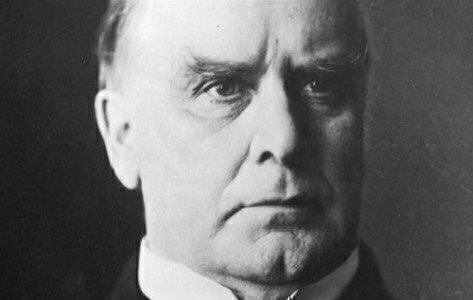He was a war hero who led America out of a recession, won a war and re-election, defined modern election campaigns, and died at an assassin’s hand. So why don’t historians respect William McKinley?
 On, January 29, 1843, McKinley was born in Niles, Ohio. He died on September 14, 1901, eight days after he was shot at the Pan-American Exposition in Buffalo.
On, January 29, 1843, McKinley was born in Niles, Ohio. He died on September 14, 1901, eight days after he was shot at the Pan-American Exposition in Buffalo.
In surveys taken of historians about Presidents, President McKinley consistently ranks as an “above average” President. McKinley has never, at least once, been considered a really good – or a really bad – President.
A quick look at McKinley’s road to the White House reveals some clues about the man, and some hints about why his presidency suggests a second look.
McKinley’s biography on the University of Virginia’s Miller Center website observes that the 25th President was more a victim of bad publicity than unwise policy decisions. “For a long time, William McKinley was considered a mediocre President, a chief executive who was controlled by his political cronies and who was pressured into war with Spain by the press,” the Center says. “Recent historians have been kinder to McKinley, seeing him instead as a decisive President who put America on the road to world power.”
It was indeed McKinley who made the decision to order a blockade of Cuba, which lead to the Spanish-American War. The brief conflict ended with the United States in possession of Puerto Rico, Guam, and the Philippine Islands. With the addition of Hawaii during McKinley’s first term, America became a global power – an act McKinley ensured by arranging for Congressional funding of the expansion efforts.
McKinley also had a direct role in managing the military campaign in Cuba using a White House war room. He was also the last President who was a Civil War veteran. (McKinley fought bravely during his time in the Army and had his horse shot out from under him in one skirmish.) His domestic record was mixed, as McKinley was seen as a pro-business President who supported tariffs and the Gold Standard, but he also opposed some trusts and monopolies.
Part of the tarnish on McKinley’s reputation was due to his relationship with Republican Party leader Mark Hanna, who in McKinley’s time was seen as manipulating the President. The two, however, had a complex relationship, and McKinley broke with Hanna when he chose Theodore Roosevelt as his running mate. Also, the huge historical presence of Roosevelt, who succeeded McKinley after his 1901 assassination, diminished McKinley’s reputation.
But McKinley set the stage for Roosevelt by becoming the first modern President to actively engage the media by holding press conferences, and he also went to national tours to speak with voters.
McKinley won election to the White House twice, defeating William Jennings Bryant in both contests by using modern campaigning strategies. The first contest in 1896 was seen as a trend-setting election that formed a new Republican coalition that lasted, with the exception of Woodrow Wilson’s presidency, until 1932. In addition, McKinley served for 14 years in Congress and he was a two-term governor of Ohio.
The biggest question about McKinley’s legacy is what would have been if he had survived the assassination attempt. The President died about six months into his second term, after complications arose from his shooting injury. Doctors initially told McKinley he would survive and there are still doubts if proper medical procedures were used in the President’s treatment.
One clue about McKinley’s second term came just before his shooting, when he told a huge crowd in Buffalo that he favored lowering tariffs and expanding trade with other nations. McKinley clearly saw America as a world power as it entered the 20th Century.







